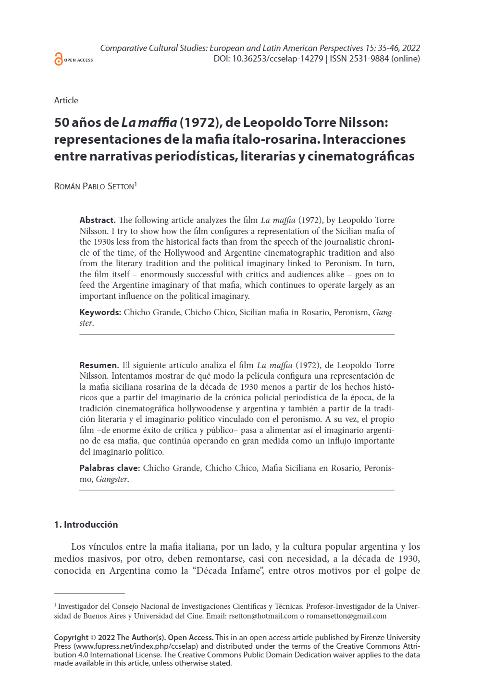Artículo
El siguiente artículo analiza el film La maffia (1972), de Leopoldo Torre Nilsson. Intentamos mostrar de qué modo la película configura una representación de la mafia siciliana rosarina de la década de 1930 menos a partir de los hechos histó-ricos que a partir del imaginario de la crónica policial periodística de la época, de la tradición cinematográfica hollywoodense y argentina y también a partir de la tradi-ción literaria y el imaginario político vinculado con el peronismo. A su vez, el propio film –de enorme éxito de crítica y público– pasa a alimentar así el imaginario argenti-no de esa mafia, que continúa operando en gran medida como un influjo importante del imaginario político. The following article analyzes the film La maffia (1972), by Leopoldo Torre Nilsson. I try to show how the film configures a representation of the Sicilian mafia of the 1930s less from the historical facts than from the speech of the journalistic chronicle of the time, of the Hollywood and Argentine cinematographic tradition and also from the literary tradition and the political imaginary linked to Peronism. In turn, the film itself – enormously successful with critics and audiences alike – goes on to feed the Argentine imaginary of that mafia, which continues to operate largely as an important influence on the political imaginary.
50 años de La maffia (1972), de Leopoldo Torre Nilsson: Representaciones de la mafia ítalo-rosarina. Interacciones entre narrativas periodísticas, literarias y cinematográficas
Fecha de publicación:
02/2023
Editorial:
Firenze University Press
Revista:
Comparative Cultural Studies
e-ISSN:
2531-9884
Idioma:
Español
Tipo de recurso:
Artículo publicado
Clasificación temática:
Resumen
Palabras clave:
Torre Nilsson
,
Narrativa Criminal
,
Cine Argentino
,
Maffia
Archivos asociados
Licencia
Identificadores
Colecciones
Articulos(SEDE CENTRAL)
Articulos de SEDE CENTRAL
Articulos de SEDE CENTRAL
Citación
Setton, Román Pablo; 50 años de La maffia (1972), de Leopoldo Torre Nilsson: Representaciones de la mafia ítalo-rosarina. Interacciones entre narrativas periodísticas, literarias y cinematográficas; Firenze University Press; Comparative Cultural Studies; 7; 15; 2-2023; 35-46
Compartir
Altmétricas




